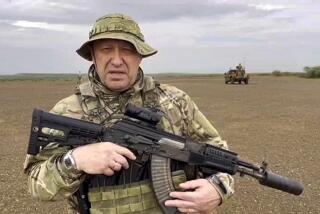Soviet Advisers Reported Aiding Iraqi Military
- Share via
WASHINGTON — Soviet military advisers, estimated to number up to 1,000, remain stationed in Iraq and appear to be providing assistance to President Saddam Hussein’s armed forces despite official Soviet condemnation of the Iraqi invasion of Kuwait, according to U.S. government sources.
The continued involvement of Soviet personnel with the Iraqi military machine has created behind-the-scenes friction between Moscow and the United States and threatens to strain superpower cooperation in resolving the Middle East crisis.
“It’s our understanding that they have the obligation not to have advisers there,” a senior U.S. official said Saturday. He said the matter had become “an issue” between Washington and Moscow.
The status of an additional 500 military advisers from other countries who are also still believed to be in Iraq remains uncertain, but a second U.S. source said that “we assume” that they continue to provide assistance to the Iraqi regime.
The complicated situation springs from the sudden reversal of long-term international support for Hussein--a turnabout that suddenly puts officially sanctioned military advisers in a position contrary to their governments’ stated foreign policies.
The non-Soviet advisers are largely private citizens, some of them representing French and German companies that have sold arms to Iraq.
Administration officials indicated that the United States is troubled by the actions of both groups but is more deeply concerned about the work being done by the Soviet advisers, whose contributions to Iraqi power and readiness are regarded as significant.
But the officials said that the ability of the United States to put effective pressure on the Soviet Union and other countries has been limited by the possibility that the foreign citizens might have been compelled to work.
“The problem is that no foreigners are allowed to leave,” said one well-placed U.S. official. “They are in the same situation as Americans. We’d be in a stronger position if people could leave.”
The official Tass news agency said Saturday that Soviet President Mikhail S. Gorbachev had ordered the creation of a special government commission to organize the evacuation of Soviet citizens in Iraq and Kuwait.
But the report indicated that only the wives and children of Soviet workers in Iraq would be evacuated. And the Defense Ministry press office, in a statement published in the armed forces daily Krasnay Zvezda, said that a “small group” of Soviet military specialists remain in Iraq “to complete intergovernmental agreements.”
“In general, they are working in maintenance factories, educational institutions and construction sites,” the report said.
The Soviet Union has for more than 20 years been the principal supplier of weapons to Iraq, including its most sophisticated tanks and fighter aircraft, in a relationship that began after the British-dominated monarchy in Baghdad was ousted in 1958.
The thousands of military advisers who have worked in Baghdad over the years have taught the Iraqis to use a wide range of purchases, including T-72 tanks and MIG-29 warplanes. Other powerful Soviet weapons in the Iraqi stockpile include Scud-B ballistic missiles and MI-24 Hind helicopters.
A U.S. government analyst said the Hussein regime has been “very paranoid” in recent years about the presence of the Soviet advisers and tended to keep them away from combat and air force units. Most of the advisers now work in logistics and maintenance roles, the analyst said.
The sources said the nationalities of the estimated 500 other advisers remain unknown, in large part because they represent private firms. But apart from some Eastern Europeans, they said most of those firms are German and French.
Some governments have limited capacity to compel action by their citizens living abroad, even if they are acting in violation of official policy, and Administration officials indicated that this could be an obstacle to resolution of the problem.
“We have no guarantees from any country that their people will come out,” one official said. But he said that, at least in the case of the European nationals, “there’s enough good will to eventually make it work.
“The governments involved do understand the irony of having sanctions at the same time their citizens are helping with weapons systems,” he said.
More to Read
Sign up for Essential California
The most important California stories and recommendations in your inbox every morning.
You may occasionally receive promotional content from the Los Angeles Times.













